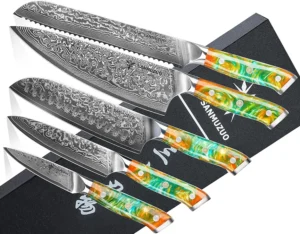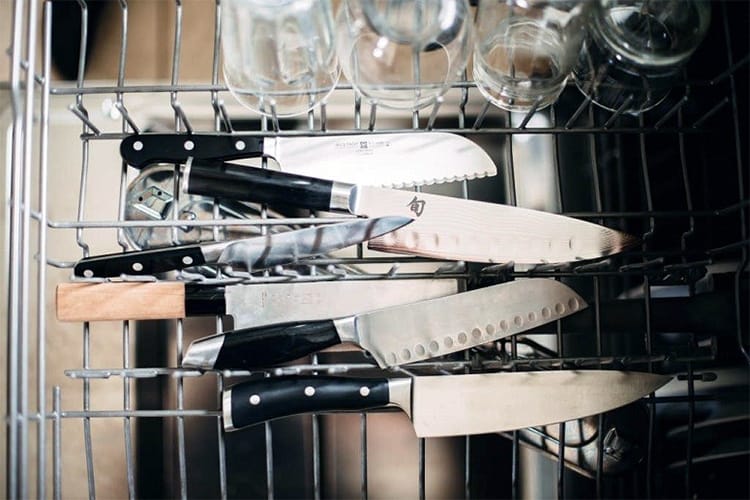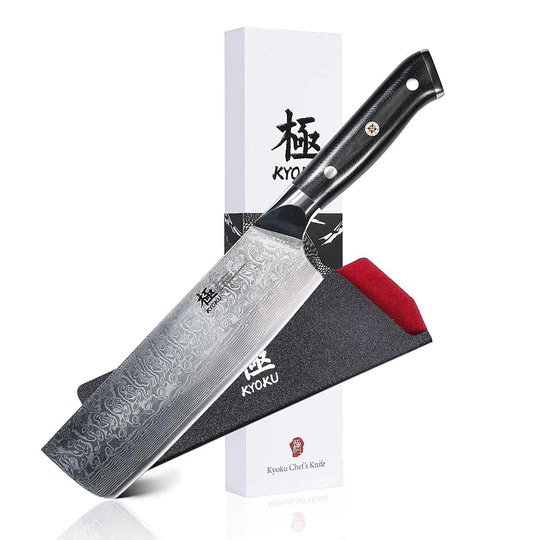


Can you simply toss your chef knife in the dishwasher? The clear answer from many experts is no, absolutely not. Your dishwasher can cause damage to your expensive, finely-tuned knives.
Proper cleaning will keep your chef knife sharp, beautiful, and effective, and extend its lifetime by reducing its vulnerability to rust. Hand washing is kinder to your knives, especially if they have wood or other natural handles.
Tossing your knives in the dishwasher saves time, but there’s a price. It’s surprisingly easy to shorten their lifespan with just a few careless washes.
High heat, harsh detergents, and all that rattling around can lead to rust, discoloration, or chips and cracks.

Dishwasher cycles blast your knives with high heat, strong chemicals, and powerful water jets. That combination can be rough on the blade.
All that spraying nudges knives around, causing them to smack into other utensils and racks. Chips and scratches happen more often than you’d think.
Detergents in dishwashers are much stronger than what you’d use by hand. Over time, these chemicals eat away at a blade’s protective coating and can cause rust or corrosion.
Not all kitchen knives are made from stainless steel that’s fully rust-resistant. Even so, you’ll see discoloration and spots if you keep using the dishwasher. The drying cycle’s heat might even soften the blade’s metal, changing how it cuts.
Knife handles come in all sorts of materials—wood, plastic, resin. The dishwasher’s heat and moisture can make wood handles swell, crack, or split.
Strong detergents strip the natural oils out of wood, leaving it rough or faded. Plastic and resin handles aren’t immune either; repeated cycles can loosen glued joints or seals, making the handle wobbly.
Sometimes, water seeps in and encourages mold. Even metal handles can suffer—seals and rivets weaken over time, making the knife less sturdy.
Dishwashers make knives bump and rub against other dishes, dulling the edge quickly. Every time your knife bangs into a plate or rack, it loses a bit of sharpness.
Harsh detergents further erode the edge, making it blunt or uneven. Even the best knives will need sharpening way more often if you use the dishwasher.
Unlike careful hand washing, the dishwasher doesn’t protect the edge. Eventually, your chef knife gets so dull it’s actually dangerous—dull knives slip and cut fingers more easily.

Keeping your kitchen knives sharp and safe really comes down to how you clean them. The method you choose affects the edge, handle, and overall lifespan.
Hand washing chef knives is simple:
Dishwasher detergents are way harsher than regular dish soap. These strong chemicals can break down metal and dull your knife’s edge.
High heat and aggressive water sprays make knives smack into other utensils, dulling or nicking the blade. Over time, your knife just won’t cut as well and won’t last as long.
Harsh chemicals can also damage coatings, making wood or glued handles crack or swell. Experts warn—the dishwasher is basically the fastest way to ruin both blade and handle.
If you want your chef knives to stay sharp and stick around, avoid the dishwasher and skip the heavy-duty detergents. Hand washing really is the way to go.
Dishwashers clean with high heat and strong detergents. These conditions can change the look, durability, and sharpness of your knives.
Stainless steel knives might seem dishwasher-safe, but they’re still at risk. Harsh detergents and a hot, wet environment break down the steel’s protective layer. Over time, you’ll notice spotting, rust, or tiny pits on the blade. Knives banging into other utensils also makes the edge dull much faster.
Even though stainless steel resists rust better than carbon steel, it’s not rustproof. Dishwashers speed up aging and dulling, and your knives lose their shine. Some stainless types are tougher than others, but gentle hand washing is always safer for the metal.
Wooden handles really take a beating in the dishwasher. Heat, moisture, and detergent dry out wood, leading to cracks, fading, or even warping.
Plastic handles hold up a bit better, but they’re not invincible. High heat can melt or make cheap plastics brittle, and repeated cycles loosen the connection between handle and blade.
Natural and composite handles are at risk, especially if glued. The glue can break down, and the handle might separate from the blade. If your knives have wood or decorative handles, wash them by hand to keep them looking good.
Carbon steel knives are super sharp, but they’re extra sensitive to corrosion. Dishwashers make rust and discoloration show up fast, since carbon steel reacts quickly to water and heat.
Even one dishwasher run can leave brown or gray marks. Detergents strip away protective oils, dulling the blade and causing pits to form.
If your carbon steel knife has a patina, the dishwasher can wipe it out in one cycle, making the blade more likely to rust. Dry carbon steel knives right after hand washing and store them somewhere dry. Using a dishwasher just shortens their life.

Want your chef knives to last? You’ll need to take care of their edge and store them right. Good habits really do make a difference.
A sharp knife is safer and just feels better to use. Regular honing keeps the blade aligned and makes slicing less annoying.
Hold a honing steel at about a 20-degree angle, then slide the blade from heel to tip with light pressure. This quick routine works before or after each use.
Eventually, your knives will need professional sharpening to get rid of nicks and restore sharpness. You can try home sharpeners, but pros give more consistent results.
To avoid dulling the blade, use cutting boards made from wood or plastic. Stay away from glass, pots, or anything too hard—those surfaces chip or blunt your knives fast.
Storing knives safely protects the blade—and your fingers. Knife blocks are a classic choice, keeping blades covered and organized on the counter.
A magnetic knife strip is handy and saves space. It keeps knives in view for quick grabs and stops blades from clashing together. Just make sure it’s strong enough for heavy chef knives.
If you prefer a tidy counter, try a knife organizer drawer tray. Each slot holds a knife so they don’t touch, reducing damage and accidental cuts.
Never toss knives in with other kitchen tools or leave them loose in the dishwasher—that’s just asking for chips and accidents. Always dry knives completely before putting them away to keep rust at bay.
Dishwashers can damage chef knives, even if they’re stainless steel. If you want your knives to last and stay sharp, taking care of them really matters.
Stainless steel knives can still get damaged in the dishwasher. High water pressure, heat, and strong detergents can cause rust, dull the blade, and even mess up the handle.
If you use the dishwasher anyway, you risk hurting the knife’s edge and finish. Hand washing is just safer for your knives.
High quality kitchen knives and fine china should not be washed in the dishwasher.
Heat and detergents can also wreck knives with wood handles because they absorb and retain moisture. This moisture will then rust the tang of the knife, which will then rust the rest of the blade.
Nonstick pans and items labeled “hand wash only” also need gentle hand washing.
If you absolutely have to put a knife in the dishwasher, place it blade side down in the utensil basket. Make sure it doesn’t touch other items, or you’ll risk dulling or chipping.
Keep knives separate from other utensils. It’s safer when you unload, too.

Dishwashers can make knife blades dull, cause rust, and ruin natural handle materials like wood. The powerful spray throws knives around, so they bump into other things and lose their edge. Harsh detergents aren’t great for most knife materials either.
Most knife makers, especially the big names, say you should wash knives by hand. Sure, some basic kitchen knives or ones with plastic handles might claim they’re dishwasher safe.
But let’s be honest—running them through the dishwasher over and over still wears them out faster. Always look at your knife’s care instructions, just in case.
Even if the company says it’s fine, hand washing really keeps your knives sharp and looking good longer.
Your dishwasher’s water jets cause a fair amount of turbulence, which jostles your dishes. This can cause your knife to bump into other utensils, which can damage the edge of the blade. When you pull your knife out of the dishwasher, it will be clean but chipped, scratched, and damaged.
This is especially true of ceramic knives, which are known for their brittle nature. Just one cycle in the dishwasher will be enough to chip or even break these knives. You could be taking out your beautiful ceramic knives in pieces.
Even if your knife doesn’t get significantly damaged, this can still wear down the blade, resulting in dull edges and points. You will find it more difficult to cut and will then need to sharpen the knife more often. This frequent sharpening itself can wear down the blade until you have no choice but to buy a new knife to replace it.

Knife Buzz offers independent product reviews on a wide range of knives used in the kitchen, home, and outdoors. We make it easy for you to find the right knife at the best price.